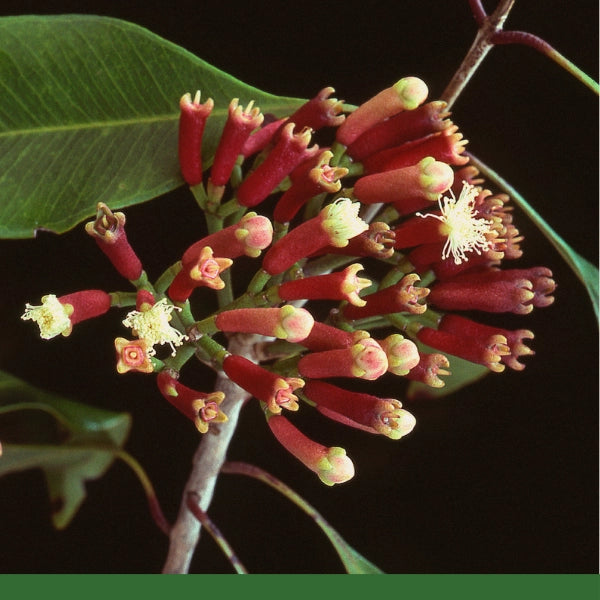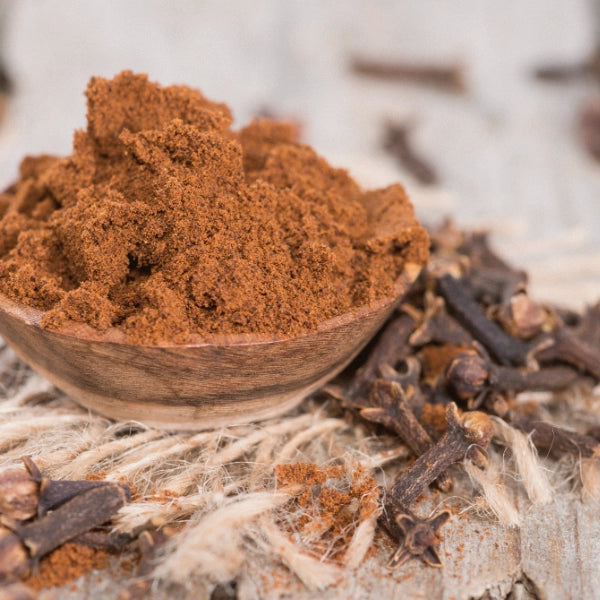Clove Powder (Syzygium aromaticum) - Dried Herb, Organic
- Regular price
- $21.51
- Sale price
- $21.51
- Regular price
-
- Unit price
- per
Couldn't load pickup availability


Clove is a small evergreen tree in the Myrtaceae or the Myrtle family, which also includes Myrtle, Pohutukawa, Bay Rum Tree, Guava, Acca, Allspice and Eucalyptus. All species are woody, contain essential oilS and have flower parts in multiples of four or five. The entire tree is highly aromatic and its Latin specific name aromaticum, refers to this intense aroma.
The generic name Syzygium is based on the Greek word "syzygos", that means "paired or joined" and is in reference to the petals which are joined. The common name "Clove", a derivative of the Latin 'clavus' meaning "nail", and refers to the shape of the Clove. This everygreen is native to the Maluku or Molucca Islands (often referred to as the Spice Islands, due, in part, to the abundance of clove) in Indonesia.
Clove has been utilized as a culinary spice for thousands of years. It is believed that spice found in a ceramic pot in Syria dating to around 1,700 BCE may have been Clove. Also, trade between the Molucca Islands, where the clove grows natively, and China goes back at least to some 2500 years ago. During the Han Dynasty, it was customary for court officials to hold Cloves in their mouths to freshen their breath while addressing the emperor.
Clove was initially brought to Europe in the 4th century by Arab spice traders and by the 16th and 17th centuries, the Portuguese were attempting to hold onto the monopoly that they had on the Clove spice trade. However, the Dutch East India Company gained control in the early 17th century, at that time Clove was a 2,000 percent markup and to maintain such high prices, often hundreds of thousands of pounds of spices were burned in huge bonfires. Eventually, a Frenchman named Pierre Poivre, started stealing the highly guarded seedlings and sending them to French colonies in the tropics, making it possible for other countries to grow this crop and, thus, ending the monopoly of the VOC. In the early 1800s the British got involved and began to establish plantations in Tanzania which has grown into the largest Clove exporter.
Traditionally, in the Molucca Islands, a love tree was planted each time a child was born leading to the abundance of this spice. Used extensively in Middle Eastern, north African, Chinese cooking (in their 5-spice powder) and Indian cuisine including garam masala. Clove is used in liqueurs and mulled wine, perfumes and even love potions. It is also indispensable in "chai", a spicy Indian tea which also contains Cardamom, Cinnamon, Ginger, Black Peppercorn and Black Tea.
The strong flavour of Cloves isn't used as much in other countries except as flavouring in some baked goods such as gingerbread. Interestingly, Cloves are not used much for cooking in their native homeland of the Molucca Islands, but rather are extremely popular as cigarettes.
In Ayurveda Medicine, Clove is referred to as "lavanga" and is used medicinally to support digestion, soothe nausea and to support lung health. It is considered to be an energetically hot herb having a pungent taste and therefore most useful in cold or stagnant conditions. In Traditional Chinese Medicine, Clove is considered a warming herb that breaks up stagnant energy by encouraging chi (energy) flow, and is used to support the kidney, spleen and stomach meridians.
Properties:
The taste and energetics of Clove are pungent, sweet, bitter, heating, astringent and drying. Clove has an affinity towards the circulatory system, immune system, musculoskeletal system, digestive system, spleen and respiratory system. For parasite cleansing combine Clove with Wormwood, Black Walnut or Thyme.
How to use:
¼-½ teaspoon of Clove to one cup of boiling water. Steep for 15 minutes, strain and drink up to three cups a day.
Cautions & contraindications:
In children, Clove oil is LIKELY UNSAFE to take by mouth. Pregnancy and breast-feeding: Clove is LIKELY SAFE when taken by mouth in amounts commonly found in food.
This information is for educational purposes only and is not intended to diagnose, treat or cure any disease or illness. Please consult your healthcare provider prior to the use of this product if you are pregnant, nursing, taking medications or have a medical condition. Individual results may vary.

